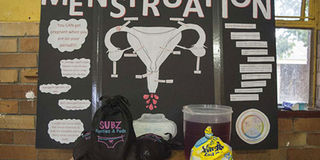Menstrual health has to be prioritised

May 28 is important as it marks the annual Menstrual Hygiene Day. PHOTO | FILE | NATION MEDIA GROUP
What you need to know:
- Sanitary pads are essential items that must be included in the current interventions being implemented in managing Covid-19.
- The current water shortage in the most populous areas of Nairobi is thus alarming because managing menstrual hygiene cannot happen without water.
The conversation on periods has for centuries been labelled a “women’s issue”.
This is because menstruation happens in the female body, which is a body that the patriarchal lens devalues.
By devaluing women’s bodies, menstruation became stigmatised as shameful and dirty even though it is central to women’s health and well-being.
As half the population menstruates with varying complications and negative side effects, the commitment of leaders — particularly in Kenya — towards comprehensively addressing period poverty is yet to be prioritised.
As a result, the patriarchal disdain expressed towards periods ends up manifesting in policies that are either not accessible, unclear, or are never a priority when it comes to implementation.
This is why May 28 is important as it marks the annual Menstrual Hygiene Day, highlighting the importance of good menstrual hygiene management (MHM) all over the world.
On this day, menstrual health awareness is explored, including discussions on specific policies that ensure menstruators have dignified and hygienic periods.
ACCESS TO PADS
In Kenya, some progress was made in 2019 towards the approval of a National Menstrual Hygiene Management (MHM) Policy, aimed at scaling up the management of menstrual hygiene, highlighting it as a rights issue.
However, its contents and implementation are yet to be seen. What is worrying is that periods do not pause for pandemics, and as Covid-19 continues to disrupt every construct of life, women and girls who desperately need menstrual products are left pleading for what should be a right - access to quality menstrual products.
It is not clear if access to quality affordable sanitary pads is part of Covid-19 response interventions.
There is no mention of how the government is planning to support issues of increased period poverty during the pandemic, with declining incomes forcing many households to choose between food, shelter, water, masks, sanitisers and sanitary pads.
These are not choices that anyone should be making, hence the urgent need for sanitary pad access and hygiene emergency policy that eases the menstrual burden.
Sanitary pads are essential items that must be included in the current interventions being implemented in managing Covid-19.
CLEAN WATER
Another key part of this policy must be hygiene. Clean water is indispensable now more than ever.
Plus its consistent supply and access not only helps in reducing coronavirus spread but also ensuring overall body cleanliness during menstruation.
That said, the current water shortage in the most populous areas of Nairobi is thus alarming because managing menstrual hygiene cannot happen without water.
This denies women and girls menstrual health dignity and puts their health and well-being at risk.
On this annual menstrual hygiene day, our leaders are reminded that prioritising the implementation of menstrual hygiene and management policies means prioritising half of the population’s health.
Scheaffer Okore is a policy analyst; [email protected]





